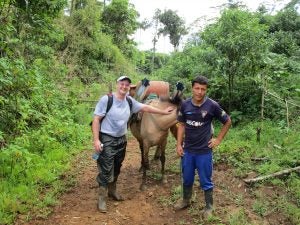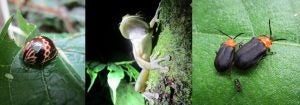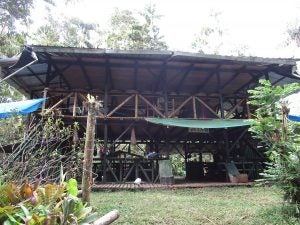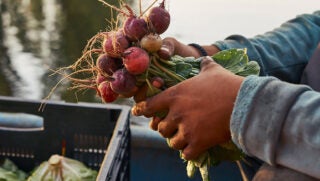In the span of 24 hours, I went from a posh four-star hotel in Miami to a basecamp in the Amazon rainforest. Admittedly, ritz wasn’t part of the original plan. A mechanical glitch caused me to miss a connecting flight, and the airline put me up. This just reinforced my resolve to effortlessly transition from laughably domesticated to roughing it extraordinaire.
But why the Amazon? I revel in challenging stereotypes. I’m not a cookie-cutter caricature of a farmboy. I travel to exotic locales. I participate in activities that no one would ever peg me doing (skydiving, ziplining, and bungee jumping come to mind). In a nutshell, go against the grain.
But this is also about personal growth — a chance to work with an old friend who runs a private preserve in Ecuador. To see the wilds of nature with ag at its doorstep firsthand. To challenge long-held personal truths. Plus, I got to indulge my interests in insects and plants, with no shortage of photo-ops.

There’s definitely a disarming quality about the rainforest, a zen-like peace that’s foreign in our 24/7 world. I imagined a house of intrigue, where factions of countless critters conspired against each other, playing a dangerous duet as both predator and prey. Despite my hyperactive imagination, not once did I ever feel uneasy about my own safety.
Getting there was the most unnerving part, with steep slopes and the occasional wayward bovine in the road. But the ecosystem sights en route were definitely a highlight of the adventure, from chaparral to cloud forest to lowland forest.
Once we hit the edge of civilization, I was smitten with some familiar faces: cacao, coffee, corn, sugar cane, and one unexpected bonus, upland rice (no flooded paddies). No doubt the land had been cleared to make way. This was a stark, and frankly, disconcerting change.
Agriculture and nature share an often tumultuous relationship. Perhaps the best analogy is marriage. One where personal boundaries haven’t been clearly spelled out. Maybe the relationship has an overbearing partner — a lout! In the Amazon, agriculture is increasingly assuming that unenviable title. Chock that up to different worldviews. Most think of ag as improving the land. Like the conquistadors of old, we’re civilizing the landscape. It’s a value-added activity, and we’re OCD when it comes to thinking in economic terms. Maybe intrinsic value doesn’t quite resonate with our lines of thought. So let’s frame it in economics to get the point across. In the biodiverse Amazon, we’re potentially trampling the next blockbuster drug underfoot. Doesn’t that have value?

My friend and guide, Thierry Garcia, graciously showed me the marvels of the rainforest, including plants with custom made “condos” for ants (we cracked one open a la Godzilla and sampled the ants — tasted like lemon). He mentioned how the peccary is the Johnny Appleseed of the rainforest, spreading seeds on its travels. There’s a vast untold narrative that most wouldn’t value, because it involves behind the scenes ecosystem services/resources, like water purification, nutrient recycling, or ethnobotanical meds. These are hard to valuate. But we have to smack a dollar value on them, all in the name of reductionist simplicity. Otherwise they’re a non-entity.
The fact is, we’ve run out of arable land. The only options are to use what we already have in production, or spill over into marginal areas. The latter might be tantalizingly attractive, but it’s ultimately defeatist. That’s not to say that farming should be 100 percent off-limits in the Amazon. No way would I suggest that it’s prudent or even viable. But we have to understand that the stakes are different in the U.S. and Amazon. Different strokes for different folks.
By the same token, we can’t dismiss ag innovations (like pesticides, fertilizers, and genetic modification) that maximize productivity on the smallest footprint of land — that’s an inconvenient truth of disastrous proportions. As my friends at the Center for Global Food Issues so persuasively point out, “growing more per acre leaves more land for nature.”
With that said, it seems that a prenup agreement is in order, forever enshrining “what’s yours is yours (nature), and what’s mine is mine (ag).” Far from deflating the romance between this odd couple, it would allow it to truly flourish in nuptial bliss. Ecuador reminded me of the staggering splendor of nature, but also the frailty of creation. We’re duty-bound as farmers to get the word out about innovations — and practice what we preach as the self-styled original stewards of the land.
Tim Durham’s family operates Deer Run Farm — a truck (vegetable) farm on Long Island, New York. As an agvocate, he counters heated rhetoric with sensible facts. Tim has a degree in plant medicine and is an Assistant Professor at Ferrum College in Virginia.



